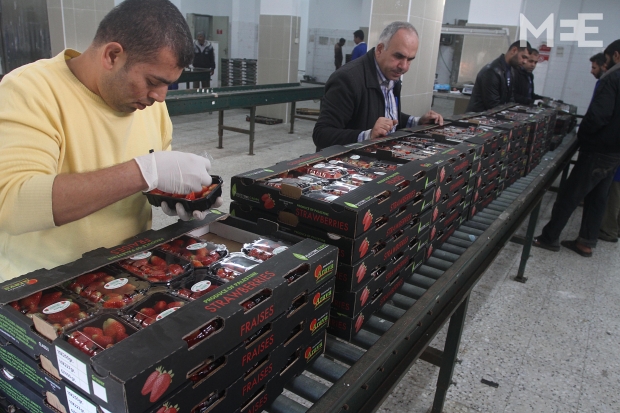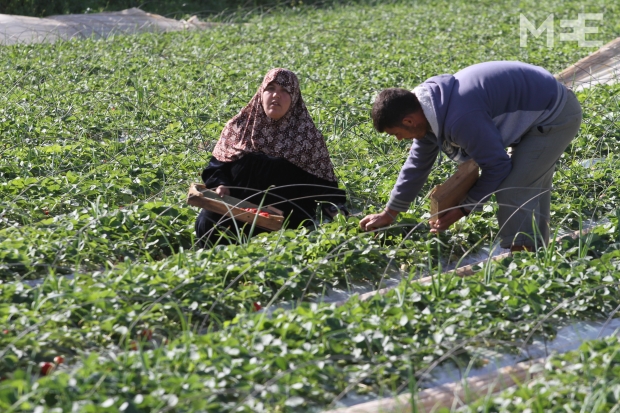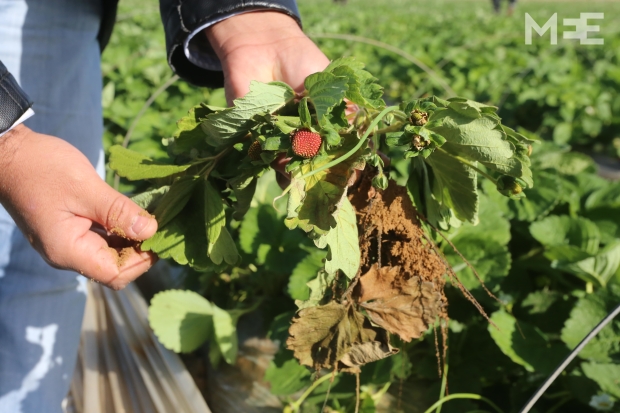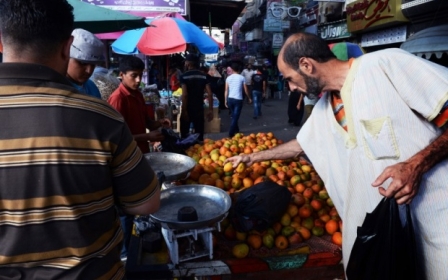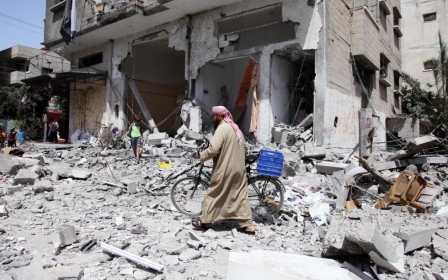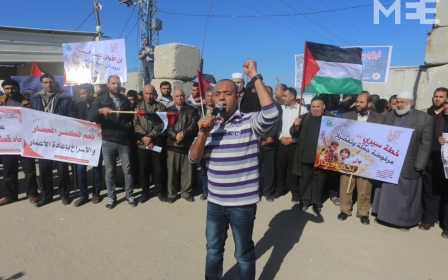The strawberry farmers of Gaza prepare crops for export
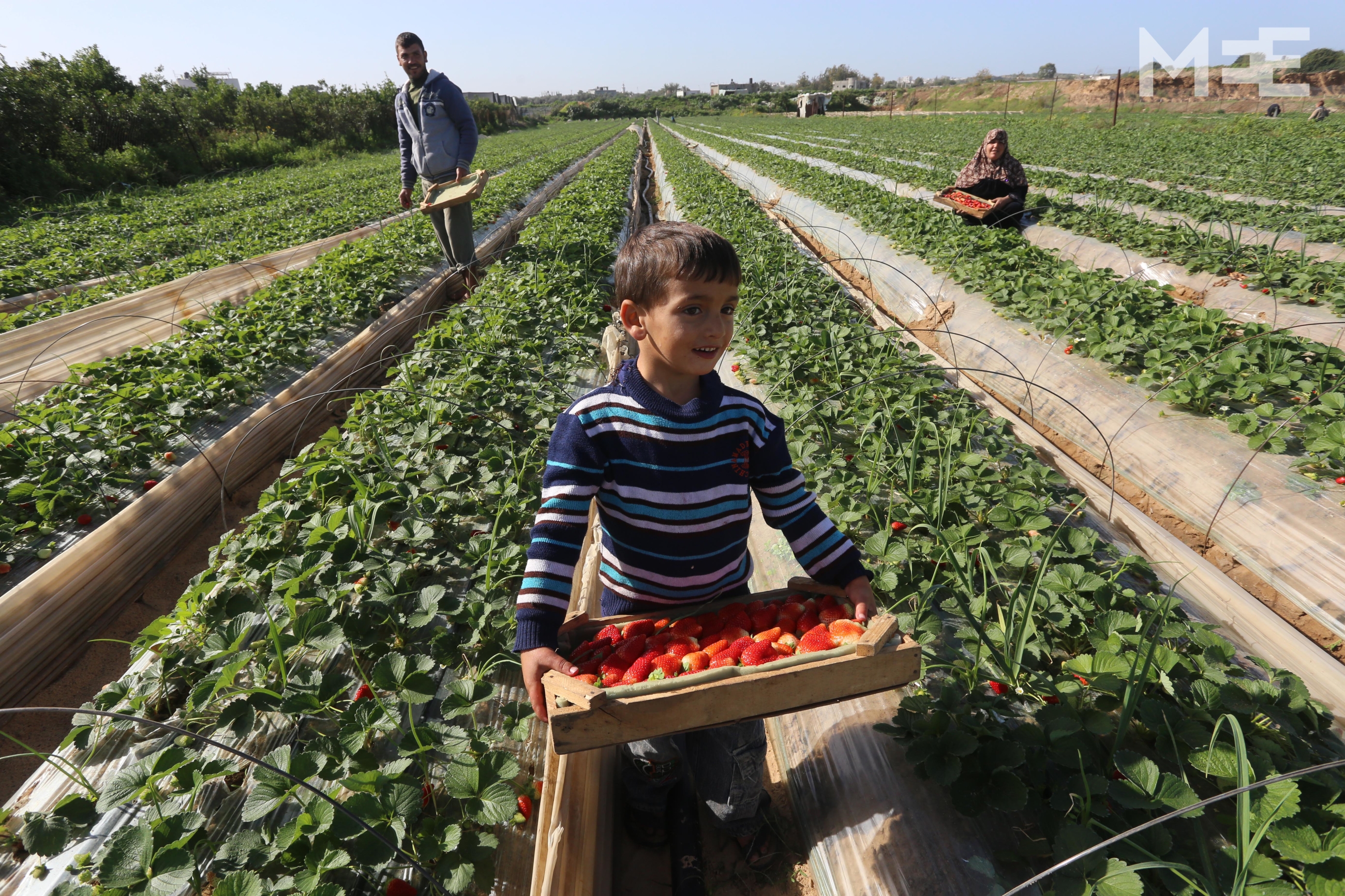
BEIT LAHIA - Gaza Strip: For over 33 years, Abu Khaled Felfel has been considered a pioneer among strawberry farmers in the Gaza Strip. He says that his happiest and proudest moments are when he sees his healthy crops exported to European markets.
Strawberries are one of the few crops that the Israeli authorities are currently allowing Gazan farmers to export to Europe.
Thanks to a programme set up by the Netherlands called the Global Gap, which is assisting him to ensure the export of his strawberries to the West Bank and wider European markets, this year is off to a good start for Felfel and his family.
Felfel is one just one of the farmers who is benefiting from the Dutch-funded project which is helping ensure that Gazan farming practices meet the quality standards of the international market.
There is growing competition in his line of work though. In the old days, he was one of only a few farmers producing strawberries and selling them to regional markets.
“In the past, countries like Jordan, Egypt and Morocco would import strawberries, but now they have become exporters too, competing with Gaza-grown strawberries,” he said.
His wife, Umm Khaled Felfel, sits in the strawberry packing house, and she expresses her joy that at least now, after the damage caused by the 51-day Israeli assault on Gaza, they can start to compensate, even a little, for some of the loss and damage sustained last summer. “I only hope that this ability to export will continue, for the long term.”
This year’s strawberry season was late starting, toward the end of August, as Felfel, like many farmers, was unable to water his fields and crops whilst under heavy Israeli military attack, which destroyed most of his plants in any event.
Felfel is pleased that Israeli authorities are allowing even a limited number of Gaza strawberry loads to be transported into the West Bank market. It's a slight improvement but it's still by no means easy. There are major delays at the commercial goods crossings and “the long hours of delays, and waiting around at Israeli-controlled checkpoints, affects the quality of the product,” he said.
While Israeli authorities only allow a few trucks of Gaza-grown fruit and vegetables across the border, Palestinian growers are demanding that more products be allowed through to minimise spoilage and loss of earnings.
This year’s opening of the border crossing means Felfel gets his products out - even if the seasonal price is not as high as he would hope.
The ministry of agriculture said that strawberry farming now costs $4,500 per dunum seasonally, while prior to the war of last summer, it was $4,000.
Before 2007, cost production was only $3,000 per dunum, and those were good days for farmers. Now, farmers using the Global Gap project can export one-third to the international market and two-thirds - classed as slightly below Global Gap specifications - can go to local markets.
Eid Siam, engineer and head of export products at the Palestinian Ministry of Agriculture, indicates that in the long term, the future for strawberry farming in Gaza looks grim:
“The land given to planting strawberries in 2007 was originally 2,300 dunums, but now it has shrunk to only 600 dunums in 2015.”
Now is the best time for exporting to European markets, but Gaza's farmers have been impeded by delays following the violence over the summer.
“Access to the West Bank market has indeed helped, albeit with long waiting periods still at checkpoints which lowers the price of the fruit in West Bank markets to 11 New Israeli Shekel (NIS) per kilo.”
To add to the worries of farmers, a new disease has also spread amongst some of the strawberry bushes threatening the future of the crops – explained Siam. A type of rot takes place which stunts growth, ruins the fruit and cannot be sold.
Beyond all of that, Felfel also agrees with his wife that the security situation is currently unpredictable and so he is unsure as to whether or not he should expand his business, just yet.
His strawberry-packing house is still standing, even after the war, but his neighbour’s packing house was damaged by Israeli tank shells during the war - and they were unable to resume production due to – as Siam says - a lack of infrastructure support.
Farmers are not alone in this; thousands of homeless families are still waiting for infrastructure reconstruction to commence, as winter kicks in and Gaza faces one of the coldest storms it has seen in some time.
Felfel acknowledged that many of his farming neighbouring remain sceptical about the future of Gaza’s strawberries as Israeli restrictions, in past years, forced them to replace strawberries with other vegetables for the local market, but which barely cover the costs of farming.
“Farmers still work with very high risks - and now they are packing strawberries for only 11 NIS per kilo or, if the commercial border closes, it could be down to 5 NIS, in the local market,” he added.
The total amount of strawberries exported so far for this season is estimated at 15 tons, but that could have doubled if farmers hadn’t suffered so much during the war, explained Siam.
Assad Mayeh, a father of five children in his early 50s, said that he works only two to three days per week, whereas in previous years, prior to the Israeli blockade on Gaza, he worked seven days a week during strawberry season.
“I had to sit at home during the war, but now with some exports allowed through, I only have part-time work, which is better than none,” he said.
Meanwhile, Umm Khaled Felfel said that she is confident that this year will be successful, after the long summer violence and war on Gaza.
She said that she enjoys sealing packages of strawberries, which will likely be opened by customers in Europe soon and she just hopes that Israel will leave the border crossing open longer and that prices will stay decent enough to continue paying 13 seasonal farm workers.
“I am happy to see our delicious strawberries making it to Europe.”
New MEE newsletter: Jerusalem Dispatch
Sign up to get the latest insights and analysis on Israel-Palestine, alongside Turkey Unpacked and other MEE newsletters
Middle East Eye delivers independent and unrivalled coverage and analysis of the Middle East, North Africa and beyond. To learn more about republishing this content and the associated fees, please fill out this form. More about MEE can be found here.


